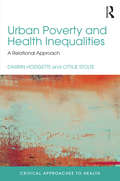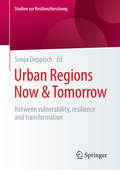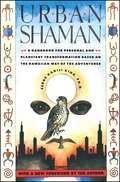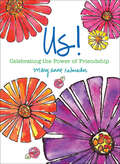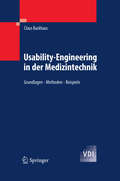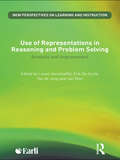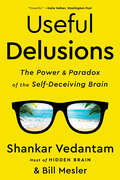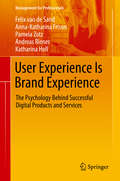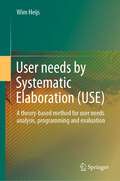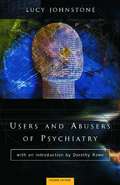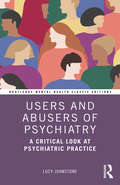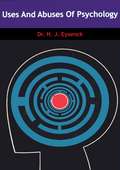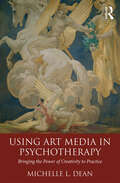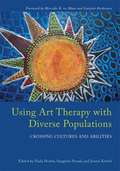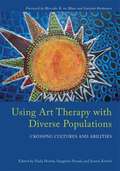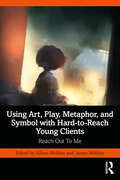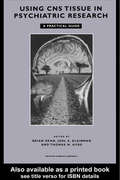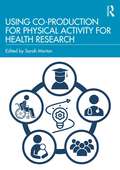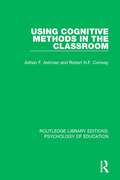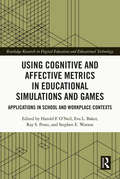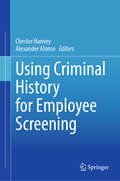- Table View
- List View
Urban Poverty and Health Inequalities: A Relational Approach (Critical Approaches to Health)
by Darrin Hodgetts Ottilie StolteWhen discussing health, we talk about ailments and afflictions, the potential of modern medicine and the behaviours that affect our health. Yet although these relationships exist, they undermine a more socio-economic understanding of health. This timely book takes a critical perspective to argue that urban poverty and health inequalities are intimately interconnected, and that the increasing disparity between rich and poor will necessarily exacerbate health issues within urban communities. Urban Poverty and Health Inequalities documents how life has become increasingly insecure and stressful for growing numbers of people due to increased insecurities in employment, income and housing, rising living costs, and the retrenchment of welfare and social services. The book explores the role of history and media depictions of poverty and health inequalities in influencing the current situation. A central objective is to advance ways to understand and respond to urban poverty as a key social determinant of health. The authors pay particular attention to the ways in which punitive responses to urban poverty are further exacerbating the hardships faced by people living in urban poverty. Looking at issues of class, age, gender, ethnic and disability-based inequalities, the book offers both critical theory and grounded solutions to enable those living in poverty to live healthier lives. The collateral damage resulting from current socio-economic arrangements reflects political choices regarding the distribution of resources in societies that needs to be challenged and changed. The authors attend to initiatives for change, offering practical responses to address urban poverty, including efforts to address wealth distribution, the potential of living wage and Universal Basic Income initiatives, social housing and anti-oppressive welfare systems.
Urban Regions Now & Tomorrow
by Sonja DeppischThis book points to three dominant concepts of how to deal with long-term or surprising and also sudden catastrophic changes, with a main focus on resilience. It is dealing with past, current and future change processes in European, Northern American as well as Australian cities and urban regions, and with the challenges they pose to a resilient urban development. Additionally, contributions deal with potential transformations of urban and regional development and related planning and governance approaches.
Urban Shaman
by Serge Kahili KingThe first practical guide to applying the ancient healing art of Hawaiian shamanism to our modern lives. Uniquely suited for use in today's world, Hawaiian shamanism follows the way of the adventurer, which produces change through love and cooperation—in contrast to the widely known way of the warrior, which emphasizes solitary quests and conquest by power. Now, even if you can't get out into the wilderness or undertake a long apprenticeship with a shaman, you can learn to practice the art of shamanism. You'll learn how to: —Interpret and change your dreams —Heal yourself, your relationships, and the environment —Cast the shaman stones to foretell the future —Design and perform powerful rituals —Shapechange —Make vision quests to other realities And more.
Urogenital Trauma: A Practical Guide
by Said Abdallah AL-MamariThis book is written in a unique style that immediately catches the reader's interest and takes him on an enjoyable and fruitful journey from the kidneys to the male genital organs. Throughout the chapters, the researchers, the practitioners, and the junior doctors under urological training are offered a rare opportunity to rapidly refresh their knowledge with updated information starting from the mythical and historical conception of the involved organ, its embryology and anatomy, and progressing to the epidemiology, etiology, anatomopathology, mechanism, treatment and prognosis of its trauma.It aims to provide the reader with the most complete and practical information possible and includes an abundant and well-selected illustration to help the learning process. A special section on male genital self-mutilations is added at the end of the book as the icing on the cake, treating this phenomenon systematically with a harmonious marriage between mythology, history, and a comprehensive literature review and management strategies. This manual has been reviewed and recommended by an internationally renowned expert in urogenital trauma and reconstructive surgery and is a very useful vade mecum for every Practitioner or resident in Urology.
Us Against Them: Ethnocentric Foundations of American Opinion
by Donald R. Kinder Cindy D. KamEthnocentrism--our tendency to partition the human world into in-groups and out-groups--pervades societies around the world. Surprisingly, though, few scholars have explored its role in political life. Donald Kinder and Cindy Kam fill this gap with Us Against Them, their definitive explanation of how ethnocentrism shapes American public opinion. Arguing that humans are broadly predisposed to ethnocentrism, Kinder and Kam explore its impact on our attitudes toward an array of issues, including the war on terror, humanitarian assistance, immigration, the sanctity of marriage, and the reform of social programs. The authors ground their study in previous theories from a wide range of disciplines, establishing a new framework for understanding what ethnocentrism is and how it becomes politically consequential. They also marshal a vast trove of survey evidence to identify the conditions under which ethnocentrism shapes public opinion While ethnocentrism is widespread in the United States, the authors demonstrate that its political relevance depends on circumstance. Exploring the implications of these findings for political knowledge, cosmopolitanism, and societies outside the United States, Kinder and Kam add a new dimension to our understanding of how democracy functions.
Us!: Celebrating the Power of Friendship
by Mary Anne RadmacherFrom the “Martha Stewart of inspired living” comes a book full of inspirational quotes and words of encouragement to help you appreciate your friends.Friends build us up. They make us stronger, smarter, and better. In this delightful, beautifully illustrated gift book; writer, artist, and friend extraordinaire Mary Anne Radmacher shares the many ways we celebrate each other.Discover the special talent that Radmacher has to change lives with her words. Read this extraordinarily touching book which includes an abundance of:Motivational quotesPoetryAphorisms about the importance of friendshipThe perfect gift for friends or yourself. With original four-color lettering, art and design, Mary Anne offers a funny, sweet, and perfect book for any occasion. “When we have a circle of friends, we have more fun. We get more done, we feel and are stronger, and we really do celebrate the power of our ‘us,’” says Mary Anne Radmacher.
Usability-Engineering in der Medizintechnik
by Claus BackhausErgonomisch gestaltete Medizintechnik führt zu effizienteren Arbeitsabläufen, erhöht die Patientensicherheit und reduziert die Arbeitsbelastung. Das Buch erläutert, wie Medizintechnik an die Bedürfnisse der Nutzer und Anwender angepasst werden kann. Durch das beschriebene Vorgehen ist es möglich, sowohl die Anforderungen der harmonisierten Normen DIN EN 62366 und DIN EN 60601-1-6 umzusetzen als auch neue Lösungsansätze für die Entwicklung innovativer Medizintechnik zu erarbeiten. Die Umsetzung wird anhand ausgewählter Praxisbeispiele erörtert.
Use of Representations in Reasoning and Problem Solving: Analysis and Improvement (New Perspectives on Learning and Instruction)
by Lieven VerschaffelWithin an increasingly multimedia focused society, the use of external representations in learning, teaching and communication has increased dramatically. Whether in the classroom, university or workplace, there is a growing requirement to use and interpret a large variety of external representational forms and tools for knowledge acquisition, problem solving, and to communicate with others. Use of Representations in Reasoning and Problem Solving brings together contributions from some of the world’s leading researchers in educational and instructional psychology, instructional design, and mathematics and science education to document the role which external representations play in our understanding, learning and communication. Traditional research has focused on the distinction between verbal and non-verbal representations, and the way they are processed, encoded and stored by different cognitive systems. The contributions here challenge these research findings and address the ambiguity about how these two cognitive systems interact, arguing that the classical distinction between textual and pictorial representations has become less prominent. The contributions in this book explore: how we can theorise the relationship between processing internal and external representations what perceptual and cognitive restraints can affect the use of external representations how individual differences affect the use of external representations how we can combine external representations to maximise their impact how we can adapt representational tools for individual differences. Using empirical research findings to take a fresh look at the processes which take place when learning via external representations, this book is essential reading for all those undertaking postgraduate study and research in the fields of educational and instructional psychology, instructional design and mathematics and science education.
Useful Delusions: The Power And Paradox Of The Self-deceiving Brain
by Shankar Vedantam Bill MeslerFrom the New York Times best-selling author and host of Hidden Brain comes a thought-provoking look at the role of self-deception in human flourishing. Self-deception does terrible harm to us, to our communities, and to the planet. But if it is so bad for us, why is it ubiquitous? In Useful Delusions, Shankar Vedantam and Bill Mesler argue that, paradoxically, self-deception can also play a vital role in our success and well-being. The lies we tell ourselves sustain our daily interactions with friends, lovers, and coworkers. They can explain why some people live longer than others, why some couples remain in love and others don’t, why some nations hold together while others splinter. Filled with powerful personal stories and drawing on new insights in psychology, neuroscience, and philosophy, Useful Delusions offers a fascinating tour of what it really means to be human.
User Experience Is Brand Experience: The Psychology Behind Successful Digital Products and Services (Management for Professionals)
by Felix van de Sand Anna-Katharina Frison Pamela Zotz Andreas Riener Katharina HollThis book offers a new method for aligning brand management and user experience goals. Brand management deals with conveying individual brand values at all marketing contact points, the goal being to reach the target group and boost customer retention. In this regard, it is important to consider the uniqueness of each brand and its identity so as to design pleasurable and high-quality user experiences. Combining insights from science and practice, the authors present a strategy for using interaction patterns, visual appearance, and animations to validate the actual brand values that are experienced by users while interacting with a digital product. Further, they introduce a 'UX identity scale' by assigning brand values to UX related psychological needs. The method applied is subsequently backed by theoretical concepts and illustrated with practical examples and case studies on real-world mobile applications.
User needs by Systematic Elaboration (USE): A theory-based method for user needs analysis, programming and evaluation
by Wim HeijsThe design of a building can facilitate the process of use and promote the well-being of users if it meets their needs. Knowledge of user needs and processes of use is important for a good design. However, it is not self-evident what user needs really are, how user needs and processes of use can be researched, and how that knowledge can be used in a design. This book introduces an integrated methodology for the analysis of user needs, programming and evaluation that answers these questions. The purpose is to improve the interaction between the users and their environment and to avoid failure costs by facilitating proper design decisions. The theoretical perspective and the conceptual framework originate from environmental psychology, more specifically P-E fit theory. The target group consists of those who are interested in creating environments for people (designers, users, real estate managers; students and scientific staff). Designers are a special audience for whom the book can be a guide to working for and with users. The theoretical perspective and the conceptual framework can also be relevant for scientific research into the interaction between users and buildings.
Users and Abusers of Psychiatry: A Critical Look at Psychiatric Practice
by Lucy JohnstoneUsers and Abusers of Psychiatry is a radically different, critical account of the day-to-day practice of psychiatry. Using real-life examples and her own experience as a clinical psychologist, Lucy Johnstone argues that the traditional way of treating mental illness can often exacerbate people's original difficulties leaving them powerless, disabled and distressed.In this completely revised and updated second edition, she draws on a range of evidence to present a very different understanding of psychiatric breakdown than that found in standard medical textbooks.Users and Abusers of Psychiatry is a challenging but ultimately inspiring read for all who are involved in mental health - whether as professionals, students, service users, relatives or interested lay people.
Users and Abusers of Psychiatry: A Critical Look at Psychiatric Practice (Routledge Mental Health Classic Editions)
by Lucy JohnstoneUsers and Abusers of Psychiatry is a radically different, critical account of day-to-day practice in psychiatric settings. Using real-life examples and her own experience as a clinical psychologist, Lucy Johnstone argues that the traditional way of treating mental distress can often exacerbate people's original difficulties, leaving them powerless and re-traumatised. She draws on a range of evidence to present a very different understanding of psychiatric breakdown than that found in standard medical textbooks, and to suggest new ways forward. The extended introduction to this Classic Edition brings the book up to date by revisiting its themes and tracing the changes in mental health practice over the last three decades. The book’s accessibility and clarity have ensured that it remains a classic in a growing field, and it is as relevant today as when it was first published. Users and Abusers of Psychiatry is a challenging but ultimately inspiring read for all who are involved in mental health – whether as professionals, students, service users, relatives or interested lay people.
Uses and Abuses of Psychology
by Dr H. J. EysenckThis first book by German-born psychologist Hans Jürgen Eysenck's is considered a classic amongst scholars and professionals of psychology. It describes the pitfalls of psychology, and the remedies that can be applied. A strong dependence on statistics and the experimental method is emphasized as essential to good psychology.The book is divided into four sections: Intelligence Testing, Vocational Psychology, Abnormal Behaviour, and Social Attitudes. Can an intelligence test administered to an eight year old predict adult performance? Is interviewing a good way of selecting the best applicant for a job? Is there such a thing as 'normal' behaviour? Can surveys such as the Gallup poll be of assistance to psychologists? Eysenck answers these and other questions.A book not to be missed by anyone interested in psychology.
Uses of Technology in Primary and Secondary Mathematics Education: Tools, Topics And Trends (ICME-13 Monographs)
by Paul Drijvers Lynda Ball Hans-Stefan Siller Silke Ladel Michal Tabach Colleen ValeThis book provides international perspectives on the use of digital technologies in primary, lower secondary and upper secondary school mathematics. It gathers contributions by the members of three topic study groups from the 13th International Congress on Mathematical Education and covers a range of themes that will appeal to researchers and practitioners alike. The chapters include studies on technologies such as virtual manipulatives, apps, custom-built assessment tools, dynamic geometry, computer algebra systems and communication tools. Chiefly focusing on teaching and learning mathematics, the book also includes two chapters that address the evidence for technologies’ effects on school mathematics. The diverse technologies considered provide a broad overview of the potential that digital solutions hold in connection with teaching and learning. The chapters provide both a snapshot of the status quo of technologies in school mathematics, and outline how they might impact school mathematics ten to twenty years from now.
Using Art Media in Psychotherapy: Bringing the Power of Creativity to Practice
by Michelle L. DeanUsing Art Media in Psychotherapy makes a thoughtful and contextual argument for using graphic art materials in psychotherapy, providing historical context for art materials and their uses and incorporating them with contemporary practices and theories. Written with an analytic focus, many of the psychological references nod to Jung and post-Jungian thought with keen attention to image and to symbolic function. This book jettisons the idea of reductionist, cookbook approaches and instead provides an integrated and contextual understanding of the origins of each art form as well as an insightful use for each in its application in mental health healing practices. Using Art Media in Psychotherapy gives clinicians and students alike the tools they need to offer psychologically minded and clinically astute choices that honor their clients.
Using Art Therapy With Diverse Populations: Crossing Cultures and Abilities
by Paula Howie Sangeeta Prasad Jennie Kristel Mercedes B. Ter Maat Gaelynn P. Wolf BordonaroArt is a recognised and effective form of therapy that is used all over the world. Yet are the approaches used as universal as the successes? Written with an international focus, this book considers how culture impacts the practice of art therapy in a variety of settings. With contributions from experienced art therapists who have worked in diverse environments, this book attempts to understand and highlight the specific cultural, subcultural and ethnic factors that inform art therapy treatment. It addresses variable factors including setting, population, environment and ability, and how they influence art therapy approaches. It also considers how cultural differences can impact physical art making through choices of color, symbol and metaphor. Each chapter provides a framework showing how art therapy techniques have been used in order to successfully work with distinct populations. This book will provide practitioners with ideas for how to adapt art therapy training and approaches to suit the setting and meet the needs of a huge range of populations. Full of informative case studies, this book will be invaluable reading for art therapists and students of art therapy.
Using Art Therapy with Diverse Populations: Crossing Cultures and Abilities
by Paula Howie Sangeeta Prasad Jennie Kristel David Gussak Doris Arrington Mimi Farrelly-Hansen Daniel Blausey Linda Gantt Catherine Moon Kate Baasch Donna Betts Tracy Councill Barbara Sobol Gaelynn P. Bordonaro Mercedes B. Maat Audrey di Maria Nankervis Heidi Bardot Michelle L. Dean Valery Shuman Charlotte Boston Marian Liebmann Katharine Phlegar Yasmine J. Awais Lisa Raye Garlock Reshma Malick Emmy Lou Glassman Frances E. Anderson Linda Levine Madori Louis Tinnin Deni Brancheau Shanthi Ranganathan Cheryl Doby-CopelandWhether working in urban areas with high levels of cultural diversity, providing art therapy to 'unique' populations such as prisoners or asylums seekers, or introducing art therapy programs to parts of the world in which it is not yet established, it is essential that therapists understand the importance of practicing in a culturally sensitive manner. This comprehensive book considers how culture impacts the practice of art therapy in a variety of settings. With contributions from experienced art therapists who have worked in diverse environments, this book attempts to understand and highlight the specific cultural, subcultural and ethnic influences that inform art therapy treatment. It addresses variable factors including setting, population, environment and ability, and how they influence art therapy approaches. It also considers how cultural differences can impact physical art making through choices of color, symbol and metaphor. Each chapter provides a framework showing how art therapy techniques have been used in order to successfully work with distinct populations. This book will provide practitioners with ideas for how to adapt art therapy training and approaches to suit the setting and meet the needs of a vast range of populations. Full of informative case studies, this book will be invaluable reading for art therapists and students of art therapy.
Using Art, Play, Metaphor, and Symbol with Hard-to-Reach Young Clients: Reach Out To Me
by Aileen Webber James WebberThis book demonstrates some of the unique ways in which therapists can help complex and vulnerable clients considered "hard-to-reach", using arts media and play. Using a wealth of case studies, contributors describe their unique therapeutic attempts to reach clients who, for various reasons, seem unreachable. These moving therapeutic journeys are described in a phenomenological, auto-ethnographic way by the therapists themselves, as a series of "snapshot" glimpses into the therapy room. The therapists describe how combinations of art, play, metaphor, and imagination have helped them navigate the complex pathways to reach their clients. Each chapter is fully supported by the contributing therapists' own selection of theoretical ideas and analysis. The book will help therapists consider innovate creative approaches in their work with clients who have been deemed too complex to work with in individual therapy, emphasising the importance of play and arts resources in helping them achieve this.
Using CNS Autopsy Tissue in Psychiatric Research: A Practical Guide
by Brian Dean Thomas M Hyde Joel E KleinmanEssential for the laboratory, this practical manual presents a wide variety of techniques associated with the use of human CNS tissue obtained at autopsy. The book contains detailed methodologies in discrete chapters written by an expert in the specific field. It also addresses the potential for extending molecular studies in brain tissue obtain
Using Co-Production for Physical Activity for Health Research
by Sarah MortonThis is the first research methods book on the application of using a co-production approach for physical activity for health research. When used for research, co-production has potential to be hugely impactful. The underpinning ethos of co-production is to involve multiple and varied stakeholders throughout the process. This book offers evidence-based guidance, case studies, and reflections on using co-production specifically for physical activity and health research. By involving users at every stage, from conception to finalization of outputs, the book demonstrates the power of co-production as a tool for positive change across society, providing insights into understanding user needs, addressing barriers, developing meaningful outputs, and enhancing policy implementation. This book not only captures the current state of co-production within the field, but also lays the groundwork for future developments. The book offers insights into best practices, evidence-based approaches, and strategies to rectify any deviations from the intended co-production process. By exploring the 'what next' for the field, the authors encourage ongoing innovation and advancement in co-production methodology, and by involving a wide range of stakeholders in research, it provides a bridge between academics and non-academics. With its comprehensive coverage of co-production, physical activity for health, and the intersection between the two, this book provides a vital resource for researchers in qualitative research, physical activity, healthcare, intervention design and development, and wellbeing. It is also vital reading for practitioners and policymakers seeking to harness the potential of co-production to drive positive change in promoting physical activity and improving health outcomes for individuals and society at large.
Using Cognitive Methods in the Classroom (Routledge Library Editions: Psychology of Education)
by Adrian F. Ashman Robert N.F. ConwayHow can teachers provide the best learning experiences for students with varying skills and abilities? Teachers have many common needs. Most work in a situation of high demands and expectations, but against a background that reflects a reduced valuation of their efforts. Originally published in 1993, the authors share some thoughts about contemporary teaching practice and suggest an approach – Process-Based Instruction – for a coherent cognitive education programme that draws on the literatures of educational psychology and educational theory and practice. The book is supported throughout with exercises and illustrations designed to help teachers apply new strategies to classroom practice, particularly in areas of the curriculum concerning problem solving.
Using Cognitive and Affective Metrics in Educational Simulations and Games: Applications in School and Workplace Contexts (Routledge Research in Digital Education and Educational Technology)
by Harold F. O'NeilPresenting original studies and rich conceptual analyses, this volume explores how cognitive and affective metrics can be used to effectively assess, modify, and enhance learning and assessment outcomes of simulations and games used in education and training. The volume responds to the increasing use of computer-based simulations and games across academic and professional sectors by bringing together contributions from different research communities, including K-12 and postsecondary education, medical, and military contexts. Drawing on empirical results, the chapter authors focus on the design and assessment of educational simulations and games. They describe how quantitative and qualitative metrics can be used effectively to evaluate and tailor instructional resources to the cognitive and affective needs of the individual learner. In doing so, the volume enhances understanding of how games and simulations can intersect with the science of learning to improve educational outcomes. Given its rigorous and multidisciplinary approach, this book will prove an indispensable resource for researchers and scholars in the fields of educational assessment and evaluation, educational technology, military psychology, and educational psychology.
Using Cognitive and Affective Metrics in Educational Simulations and Games: Applications in School and Workplace Contexts (Routledge Research in Digital Education and Educational Technology)
by Harold F. O'NeilPresenting original studies and rich conceptual analyses, this volume explores how cognitive and affective metrics can be used to effectively assess, modify, and enhance learning and assessment outcomes of simulations and games used in education and training.The volume responds to the increasing use of computer-based simulations and games across academic and professional sectors by bringing together contributions from different research communities, including K-12 and postsecondary education, medical, and military contexts. Drawing on empirical results, the chapter authors focus on the design and assessment of educational simulations and games. They describe how quantitative and qualitative metrics can be used effectively to evaluate and tailor instructional resources to the cognitive and affective needs of the individual learner. In doing so, the volume enhances understanding of how games and simulations can intersect with the science of learning to improve educational outcomes. Given its rigorous and multidisciplinary approach, this book will prove an indispensable resource for researchers and scholars in the fields of educational assessment and evaluation, educational technology, military psychology, and educational psychology.
Using Criminal History for Employee Screening
by Chester Hanvey Alexander AlonsoThis book addresses the use of criminal history screening in employment decisions, assessing strategies for making fair and valid employment decisions. Contributors include a multidisciplinary range of experts from I/O psychology, criminology, Human Resources, government enforcement, and law. Among the topics covered: Discrimination and related legal risk Legal analysis of negligent hiring and related risks Legal analysis of employment discrimination Current Human Resources practices Alternative strategies for reducing risk Using Criminal History for Employee Screening will serve as a definitive resource for the appropriate and ethical use of criminal history screenings, and will be of use for researchers in I/O psychology and criminology, as well as business professionals in Human Resources and legal fields.
